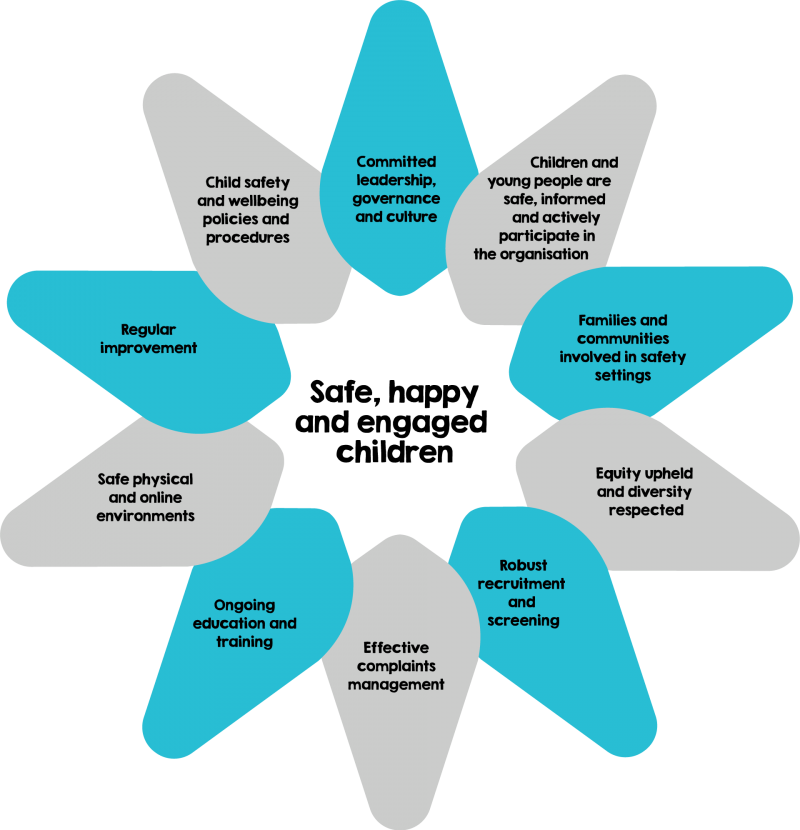Child Safe Organisation
Beehive is committed to ensuring a respectful learning environment that is safe, positive and supportive for all students. The Beehive Montessori School implements the National Child Safe Organisation Principles through this Child Safe Organisation Framework to underpin all Beehive’s policies, procedures, practices and strategies to ensure the provision of an environment where children feel respected, valued, supported and safe from harm.
The School expects all School community members including students, parents, staff, volunteers, visitors and contractors to share this commitment. The Beehive Montessori School Child Protection Advice brochure is available in the office for all community members.

Our commitment to the Child Safe Organisation Framework is evident in:
Policies
The National Child Safe Organisation Principles underpin all policies relating to student health, safety and wellbeing, in particular the Child Protection Policy, Student Code of Conduct, Staff Code of Conduct, Complaints (and Feedback) Policy, Network Usage Policy, Behaviour Policy and Code of Conduct (with the latter two policies read and signed by parents at enrolment.)
Most policies are reviewed by staff and the Board biennially; the Child Protection Policy and Staff Code of Conduct are reviewed annually. All School policies are available on our website.
Professional Development
All staff participate in annual Child Protection and Mandatory Reporting training. This includes how to recognise the indicators of grooming and child abuse, reporting obligations, and prevention strategies. Further information is outlined in the Child Protection Policy and Staff Code of Conduct.
Employment Procedures
All School employees, volunteers who are not parents at the school and parents of children at the school who undertake a professional role at the school must hold a current Working With Children Check (WWCC) prior to commencing employment or their role at the school.
The details of this are recorded on a central register held by WWCC, ensuring the School is notified of any breach of conditions.
All teachers must be registered with the Teacher Registration Board of WA (TRBWA). In the event of any serious misconduct by a teacher, it is required by law to be reported to the Police and TRBWA.
All new teaching staff to the school are interviewed and questioned about their interests and experience in working with children, and their understanding and training in the area of child abuse and grooming. The recruitment process for all staff also includes written and verbal reference checks, WWCC validity check and an induction process. This induction process has a child safety focus and enables all staff to be aware of their child safe responsibilities, including reporting obligations.
All employees and regular contractors acknowledge and comply with the Staff Code of Conduct, including what to do in the event of a breach of this Code. This Code of Conduct is reviewed by staff on an annual basis, as is the Child Protection Policy.
Volunteers Procedures
The Staff Code of Conduct and Child Protection Policy are essential elements of the volunteer induction and it is expected that all volunteers will comply with this code. Volunteers are also given a copy of the Beehive Montessori School Child Protection Advice brochure. The volunteer process involves an observation in one or more classroom followed by a meeting with the Assistant Principal at which the Child Protection Policy, Staff Code of Conduct, Network Usage Policy and Privacy Policy are discussed, along with other factors relevant to the volunteer. After volunteering in a classroom, if the volunteer is suitable to be added to the School’s relief list, the above employment procedures apply.
Protective Behaviours Curriculum
The Beehive Montessori School has adopted the Keeping Safe Child Protection Curriculum (KS:CPC) which has specific lessons designed for each age group. This is a respectful relationships and child safety curriculum that teaches all children and young people they have the right to be safe and they can help themselves to be safe by talking to people they trust.
The KS:CPC is divided into four Focus Areas:
- The right to be safe (feelings, being safe, warning signs, risk taking and emergencies)
- Relationships (rights and responsibilities, identity and relationships, power in relationships, trust and networks)
- Recognising and reporting abuse (privacy and the body, recognising abuse, secrets)
- Protective strategies (strategies for keeping safe, persistence)
All teachers and teacher assistants undertake professional learning in the Keeping Safe curriculum.
Complaints Process
The School’s Complaints (and Feedback) Policy includes child friendly process that empowers children to make complaints to an adult they trust. In keeping with this, each classroom displays a ‘Speak Up’ poster as a reminder that children have the right to feel safe and be heard. This process is discussed in each class at an age appropriate level on a regular basis to ensure students feel supported to express their views. To support the complaints process at playtime, teachers on playground duty make notes of student complaints, and the actions taken, specific to that time. Actions taken are reported back to the student who raised the complaint.
Physical and Online Environment
Risks in the physical and online environments are identified and mitigated to ensure a child safe environment where opportunities for grooming behaviour, bullying and harassment and child abuse are eliminated. Both the physical and online environments are used by everyone in accordance with all School policies and procedures.
The safety and wellbeing of every student at the Beehive Montessori School is our priority, and we value working in collaboration with staff, parents, visitors, volunteers and students to ensure this.